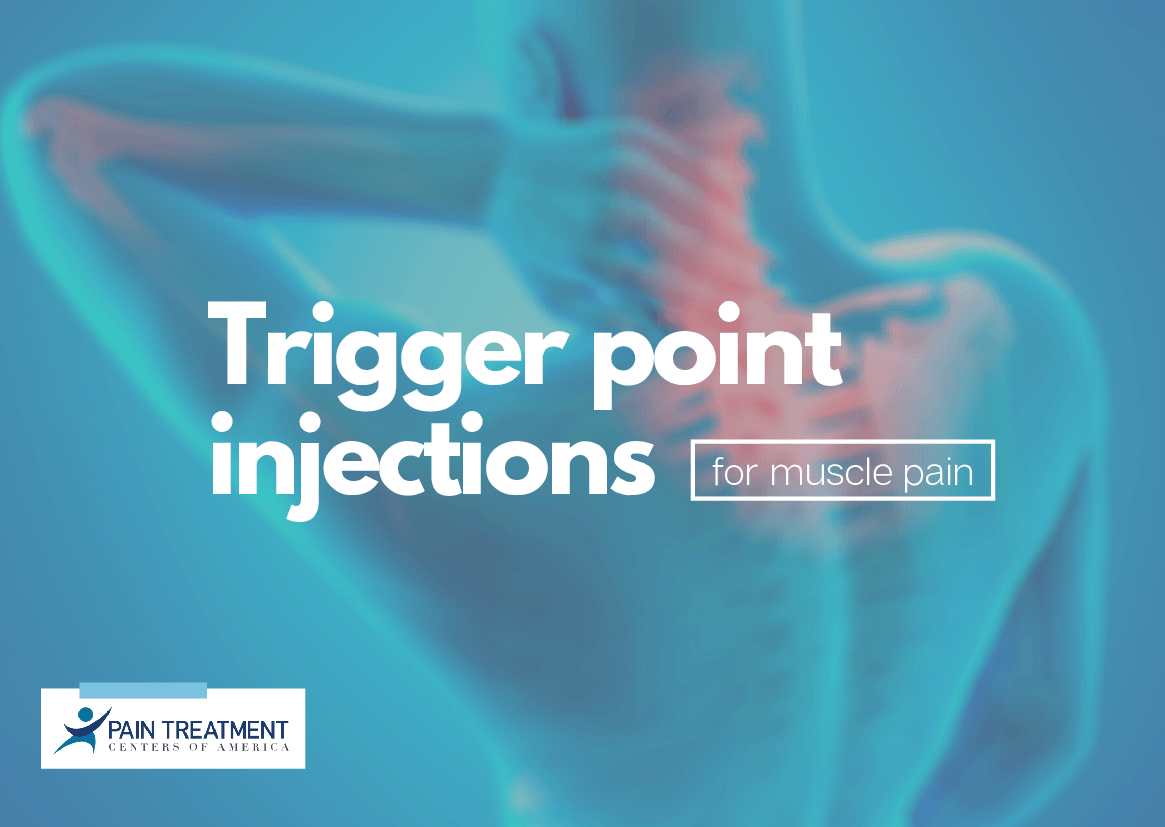Trigger Point Injections for Muscle Pain

Muscle pain is one of the most common and often ongoing complaints of people seeking pain treatment. A large percentage of muscle pain is due to clusters of muscle fibers that have become tight and ropey due to injury, overuse, stress or anxiety. These knots can cause points of intense muscle pain known as “trigger points”. Chronic trigger point pain is known as chronic myofascial pain syndrome1. The word myofascial refers to the muscles and surrounding fascia.
Trigger points can lead to decreased range of motion and persistent pain that negatively impacts a person’s quality of life. While massage and techniques like the Spray and Stretch can temporarily relieve trigger point pain, other treatment modalities are often needed for greater or longer lasting pain relief. One treatment option that shows a high effectiveness in treating trigger point pain is trigger point injection.
What Causes Trigger Points to Form in Muscles?
Myofascial trigger points can form after repeated stress on a muscle.
When a muscle is contracted repeatedly or often undergoes long periods of tension, a knot of muscle fibers can form within the muscle tissue. These knots are painful to the touch and can often cause pain to radiate into areas surrounding the affected muscle (referred pain).
Trigger points often form in muscles that are repeatedly contracted or tensed. Jobs that require repetitive movements can increase a worker’s likelihood of developing a trigger point on a muscle. People who experience high levels of stress or anxiety may also develop trigger points.
Individuals with chronic myofascial trigger points may be diagnosed with chronic myofascial pain syndrome. This condition causes ongoing and worsening discomfort due to myofascial trigger points. Acute myofascial pain syndrome may resolve on its own or with simple treatment.
What is a Trigger Point Injection?
Trigger point injection or TPI is a minimally invasive procedure that can treat painful muscle trigger points. TPI injects a mixture of local anesthetic and a steroid into a painful area of muscle. This combination of medication causes a tensed muscle to relax. It can also reduce pain-causing muscle inflammation.
Trigger point injection is an outpatient procedure that does not require sedation. Many patients with multiple trigger points receive multiple injections in one appointment. There is no downtime, and most patients experience pain relief and increased range of motion immediately or soon after the procedure.
Trigger Point Injections: Possible Side Effects
Trigger point injection carries few risks or side effects. Complications are very rare, and most patients with trigger point pain experience positive outcomes from the procedure.
Rarely, patients receiving trigger point injections experience pain or bleeding at the injection site. A miniscule number of patients may develop infection at the injection site.
Allergic reaction is a rare complication of trigger point injections. Make certain that you communicate all known allergies to your pain specialist before your TPI procedure.
Conditions Treated With Trigger Point Injections
Trigger point injections can provide pain relief for a number of conditions:
Myofascial Pain Syndrome: Myofascial pain syndrome causes significant muscle pain due to the formation of muscle trigger points. These trigger points cause pain with compression of the muscle and often produce referred pain (pain in areas outside the affected muscle). Trigger point injections can treat acute or chronic myofascial pain by inducing relaxation of trigger point muscle fibers. These injections can also interrupt nerve signals that cause referred pain.
Fibromyalgia: Fibromyalgia is
characterized by chronic pain, including tender areas on the body that are extremely sensitive to touch. Trigger point injections can relieve pain and tenderness in these areas and reduce overall pain in an affected muscle.
Tension headaches and migraines: Trigger points in the head, neck, and shoulders can cause referred pain in the head and face, leading to recurring headaches. These trigger points can also contribute to the occurrence of migraines. Trigger point injections
can help reduce trigger point pain and referred pain that can cause tension headaches. Patients with trigger points who suffer from migraines may also experience pain relief from TPI.
It’s important for all patients with problematic trigger point pain to discuss their condition with a pain management specialist.
Trigger Point Injections with Pain Treatment Centers of America
Are you suffering from acute or chronic pain with trigger points? Pain Treatment Centers of America specializes in trigger point injection therapy to relieve muscle caused by trigger points.
Contact PTCOA today to learn more about treatments or to schedule an appointment.
- "Myofascial Pain Syndrome - StatPearls - NCBI Bookshelf." 10 Jul. 2020, https://www.ncbi.nlm.nih.gov/books/NBK499882/.













